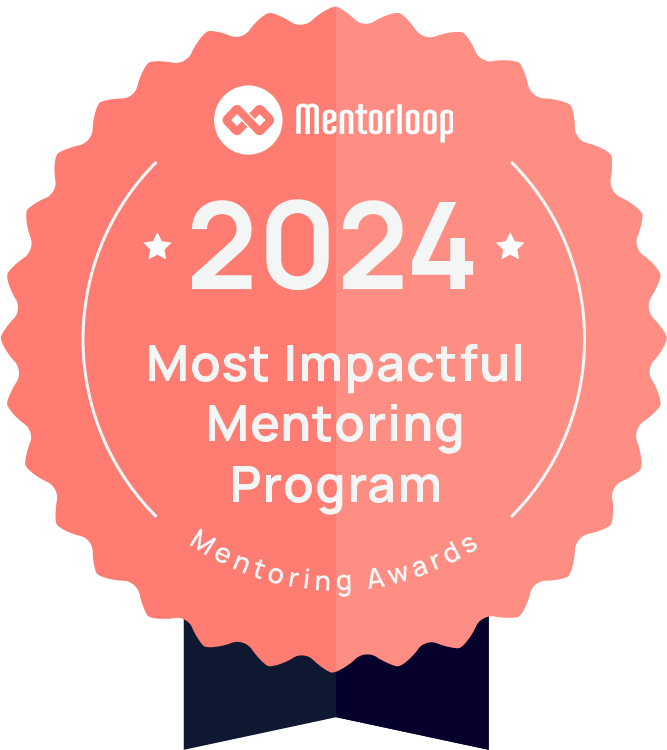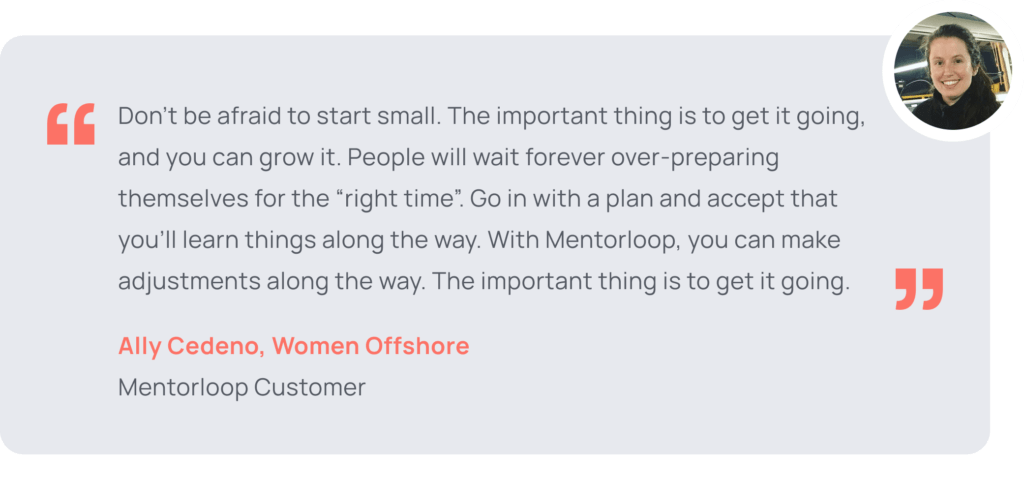
How the University of Manchester is Scaling Mentoring, with Mentorloop
with Matthew Wilders, Patrick Beare
and Anna Lomas
University of Manchester

with Matthew Wilders, Patrick Beare
and Anna Lomas
University of Manchester

Prior to engaging with Mentorloop, we ran a variety of different pilot mentoring programmes, including a mentoring programme for undergraduate students within our business school, as well as a series of targeted mentoring programmes for students and graduates who are looking to enter specific sectors.
The mentoring programme within the business school was facilitated through another mentoring platform, although there were unfortunately a number of technical issues with the platform which negatively impacted engagement across the programme.
By contrast, the targeted mentoring programmes were all conducted manually via spreadsheets and inboxes.
It became clear that due to the time involved in this approach, it would not be scalable as we look to roll out mentoring to all students at the University of Manchester. Therefore, we decided that we would need to adopt a mentoring platform that enabled us to conduct mentoring at scale as well as being reliable and encourage mentors and mentees to participate in the programme rather than posing a barrier to engagement
In the 2023-2024 academic year, the University of Manchester facilitated 174 mentoring loops using Mentorloop. These loops achieved an impressive Mentor Quality Score (MQS) of 4.41, with a post-meeting average rating of 4.75. The feedback from both mentors and mentees has been overwhelmingly positive.
The university conducted surveys throughout the program to assess mentees’ confidence across various career-related issues, using a 1 to 5 scale. By the end of the program, respondents reported significant increases in confidence, showing that participating in the mentoring program helped students become more career-ready and broaden their career prospects.
Mentors, many of whom were alumni, also benefited greatly. When surveyed, they identified key personal gains, including improved coaching and advisory skills, enhanced communication and active listening, and a deeper understanding of the student perspective in today’s job market. These experiences helped mentors reflect on their own career journeys while fostering a deeper connection with the University of Manchester.
Mentoring has now become a part of the permanent offer of the career service to students at the University of Manchester and is now supported by two permanent full-time members of staff to deliver on our mentoring programmes.
There is also the desire to expand the mentoring provision for our students to ensure that all students who wish to have an industry mentor are able to be matched with one in addition to targeting mentoring programmes to help address the attainment and progression gaps amongst underrepresented students.
We’re also engaging with Manchester Gold, our internal mentoring programme for staff here at the University of Manchester, which is delivered by our Organisational Development Team to share best practices from each of our mentoring programmes and how we can work together effectively to consolidate and improve mentoring at the University of Manchester.
Whilst we do not currently run any target mentoring programmes, we have encouraged students from a range of different underrepresented backgrounds to participate in the mentoring programmes which has been reflected within our data of the students we matched in our 2023-2024 mentoring programmes.
65% of participants came from a BAME background, and in addition, 23% of our mentees were from a widening participation background, meaning that their home postcode was either POLAR4 or quintile one, which means that there’s a lower proportion of progression to higher education or Acorn categories four (financially stretched) or five (urban adversity).
In addition, 12.1% of our mentees were from a WP plus category, meaning that in addition to their home postcode being POLAR4 quintile one or acorn categories four or five, they attained their level two or level three qualifications from a school which is flagged as having performed below the national average over a number of years.
This demonstrates how our mentoring programme has been able to help students from a range of different underrepresented backgrounds to access, support and explore career options they may not have felt possible before joining our mentoring programme.
We are currently running our graduate mentoring programme, which is targeted at students who are graduating from the University of Manchester with the aim of supporting them through the next steps after graduating and transitioning to life as a graduate.
We’ll also be reopening applications for our career mentoring programme from the start of semester one in the 2024-2025 academic year, which is focused on helping our students to explore their career options and work towards their longer-term career goals.
As we reopen applications for our career mentoring programme, we’ll also be expanding the scope of the programme as we’ll be allowing all students from the second year of their undergraduate degree onwards to apply for the programme, including postgraduate taught and postgraduate research students, as well as hoping to increase the number of loops that we’ll be facilitating through the mentoring programme.
Additionally, we’ll be exploring running targeted mentoring programmes for underrepresented students to help address the attainment and progression gaps of these students compared to their peers in line with our institutional commitments as outlined in our Race Equality Charter and Access and Participation Plan.

University of Manchester
Share this Article
Join the loop

Our mentoring programme has been able to help students from a range of different underrepresented backgrounds to access, support and explore career options they may not have felt possible before joining our mentoring programme.
– Matthew Wilders, University of Manchester

What Role Does Equity and Equality Play in Your Mentoring Program?
The right mentoring program should level the playing field to empower entire cohorts of people: workplaces, member associations, social groups and educational institutions. Equality should be a cherished value so that every individual can thrive—whoever they are, whatever their background, however they worship or whomever they love. But we can’t arrive at equality without it’s often forgotten partner, equity.

What does a Mentoring Program Coordinator do?
Being a Mentoring Program Coordinator is an incredibly rewarding experience that positively impacts the lives of many. And while mentoring programs don’t fully run themselves (even though Mentorloop can do a great deal of the heavy lifting!), they do require a point of contact that can steer the program in the right direction for the organisation that is running one.

Building Quality Feedback Into Mentoring Relationships
This is Part 8 of our 10-part series on the 10 Key Qualities and Habits of a Highly Effective Mentor.
In this post, we’ll look at how mentors can successfully build quality feedback into their mentoring. Quality feedback is priceless because it clarifies expectations, helps people learn from their mistakes, and builds confidence. It also allows mentees to more effectively take what their mentors say and turn it into action.

